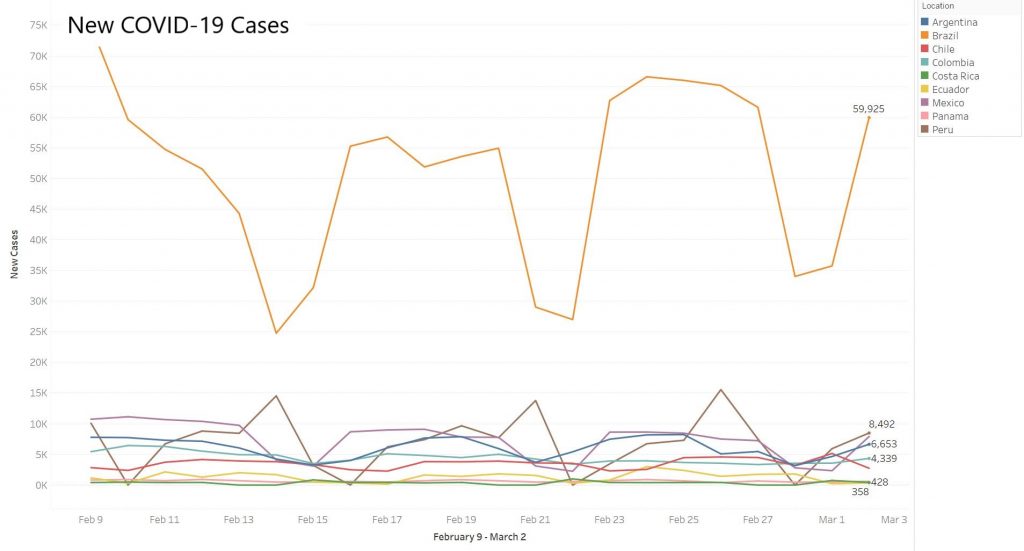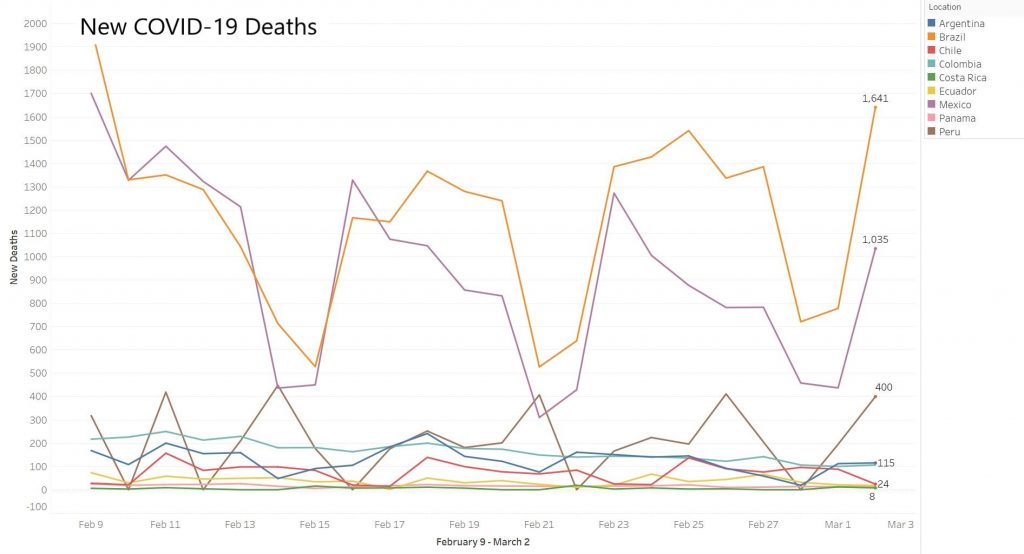What You Should Know
- 8 million more: Hunger has increased almost fourfold in El Salvador, Guatemala, Honduras, and Nicaragua in the past two years. According to the World Food Programme, the increase from 2.2 million people facing hunger in 2018 to nearly 8 million in 2021 is due to the COVID-19 pandemic and natural disasters.
- Mexico: Mexico City has suffered the highest level of excess deaths per capita of any city in the world (8,411 excess deaths per 1 million people) since the outset of the COVID-19 pandemic. The city’s level of excess deaths per capita is 46 percent higher than the next worst city (Lima, Peru).
- One year later: On the one-year anniversary of the pandemic, Pan American Health Organization Director Carissa F. Etienne described the Americas as the “epicenter” of the pandemic and called on the international community to make vaccine access a “global priority”.
- 170,000: Trinidad and Tobago Prime Minister and CARICOM Chair Keith Rowley highlighted the need for more equity in vaccine distribution, noting that the Caribbean had only received 170,000 doses from India. His comments came at the launch of the Adrienne Arsht Latin America Center’s Caribbean Initiative.Here are this week’s COVID-19 figures.
Health + Innovation
- Chile: Chile administered more than 3.1 million COVID-19 vaccine doses in three weeks, and is behind only the US, UK, the UAE, and Israel in terms of vaccinations per 100 people. The goal: 80 percent of its population vaccinated by June.
- P.1 variant: The COVID-19 variant first detected in Brazil’s Amazonas state, known as P.1, is 1.4 to 2.2 times more transmissible than previous strains, and 25 to 61 percent more capable of reinfecting people who have been infected by earlier strains.
- Colombia: On March 1, Colombia became the first country in the Americas to receive COVID-19 vaccines through the COVAX facility. The 117,000 doses of the Pfizer-BioNTech vaccine are part of the 20 million doses Colombia expects to receive from COVAX in 2021.
- Johnson and Johnson: On February 27, the US Food and Drug Administration authorized the one-shot Johnson & Johnson COVID-19 vaccine for emergency use. It is the third vaccine authorized for emergency use in the United States, following Pfizer-BioNTech and Moderna approvals. The next day, a Center for Disease Control panel recommended the vaccine for people 18 and over.
- Canada: On February 26, Canada authorized the AstraZeneca COVID-19 vaccine for adults. It is the third vaccine to receive authorization; Pfizer-BioNTech and Moderna have already been approved. Canada ordered 20 million doses of the AstraZeneca vaccine and will also receive nearly 2 million doses of the vaccine through COVAX.
- Eastern Caribbean: UN Barbados and the Eastern Caribbean launched a $30 million sub-regional COVID-19 response plan, a follow-up to the 2020 plan that sought to respond to the needs created by the pandemic.
Economies in Focus
Multilateral Commentary
- UN Secretary-General António Guterres praised Caribbean countries for their leadership during the crisis and called for a relief package equivalent to 10 percent of the global economy in a meeting with the Caribbean Community (CARICOM).
- A new IDB study recommended that the Caribbean strengthen its institutions to promote economic growth, effective monetary policy, and resilient financial systems.
Economic Relief
- The Development Bank of Latin America (CAF) approved a line of credit of up to $1 billion to strengthen Latin America’s health care systems. The funds can be used to purchase medical equipment to administer COVID-19 vaccines and to strengthen the region’s ability to track and respond to disease outbreaks.
- The IMF announced a three-year $1.8 billion loan for Costa Rica to aid the COVID-19 recovery.
Economic Impact
- Remittances to Mexico grew by 21 percent from January 2020 to January 2021, flouting original projections that remittances would sharply decrease in response to the pandemic.
- The OECD predicted that Chile’s economy would grow 4.2 percent in 2021, thanks to the country’s strong vaccination campaign.
Border Restrictions + Quarantines
Quarantines + Reopenings
- Peru ended its obligatory quarantine on March 1 and implemented new curfews for high, medium, and low-risk areas. In high-risk areas like Lima and Cusco, curfew will begin at 9:00 a.m. and last until 4:00 a.m. The measures will remain in place until March 14.
- The Mexican state of Quintana Roo eased COVID-19 restrictions allowing hotels, restaurants, shops, theaters, and theme parks to operate at 60 percent capacity ahead of academic spring breaks. The measures affect the popular tourist destinations of Tulum, Cancún, and Playa del Carmen.
- 13 of 27 Brazilian states imposed new restrictions on movement and business to avoid overwhelming health systems amid a new surge in cases and deaths. Meanwhile, São Paulo governor João Doria deemed religious gatherings to be essential activities.
Border Restrictions
- Colombia extended land and river border closures until June. The measure has been in place since March 2020.
- Argentina has extended measures closing its border to tourists until March 12. The country will also maintain its land borders closed to all travelers until March 12.
In Focus: Unequal Vaccine Access
- Argentina’s Vacuna VIP: Thousands of people demonstrated in cities across Argentina against Argentina’s VIP vaccinations. The scandal has forced Health Minister Ginés Gonzáles García’s resignation. Until February 24, only healthcare workers were eligible to receive the vaccine, although 70 people were vaccinated outside the official campaign, including the Economy Minister and former President Eduardo Duhalde.
- Peru’s Vacunagate: 500 people secretly received a Chinese vaccine ahead of thousands of medics fighting the COVID-19 pandemic in Peru. Among those vaccinated include managers of private labs, lobbyists, politicians, and children of medics connected to the phase three trials for Sinopharm. The scandal has forced Peru’s Foreign Minister Elizabeth Astete and Health Minister Pilar Mazzetti to resign. Martín Vizcarra, Peru’s former president, is also facing harsh criticism for having secretly received the vaccine in October, while serving as president, before any vaccine was approved for public use.
- Chile’s vaccine scandal: While Chile has been praised for its vaccination campaign – more than 16.5 percent of the population has been vaccinated– 37,000 people were vaccinated out of turn, according to the country’s health statistical agency.
By the numbers
- Cases by country: Brazil (10,260,621) #3 worldwide, Colombia (2,233,589) #11 worldwide, Argentina (2,077,228) #12 worldwide, Mexico (2,052,266) #13 worldwide, Peru (1,293,497) #19 worldwide, Chile (805,317) #23 worldwide, Panama (337,805) #43 worldwide, Ecuador (275,780) #47 worldwide, Bolivia (244,380) #50 worldwide, Dominican Republic (236,210) #53 worldwide, Source: worldometers.info
- Prevalence rate (total cases per million people: Panama (77,503) #11 worldwide, Aruba (72,249) #12 worldwide, Brazil (48,050) #38 worldwide, Argentina (45,689) #42 worldwide, Colombia (43,596) #47 worldwide, Chile (41,894) #51 worldwide, Costa Rica (39,634) #53 worldwide, Peru (38,880) #56 worldwide, Belize (30,486) #66 worldwide, Curaçao (28,542) #71 worldwide, Source: worldometers.info
- Deaths per capita (deaths per million people): Mexico (1,401) #18 worldwide, Peru (1,367) #19 worldwide, Panama (1,324) #21 worldwide, Brazil (1,164) #26 worldwide, Colombia (1,154) #27 worldwide, Argentina (1,133) #29 worldwide, Chile (1,048) #32 worldwide, Bolivia (977) #35 worldwide, Ecuador (874) #39 worldwide, Belize (781) #45 worldwide, Source: worldometers.info
Quick take



